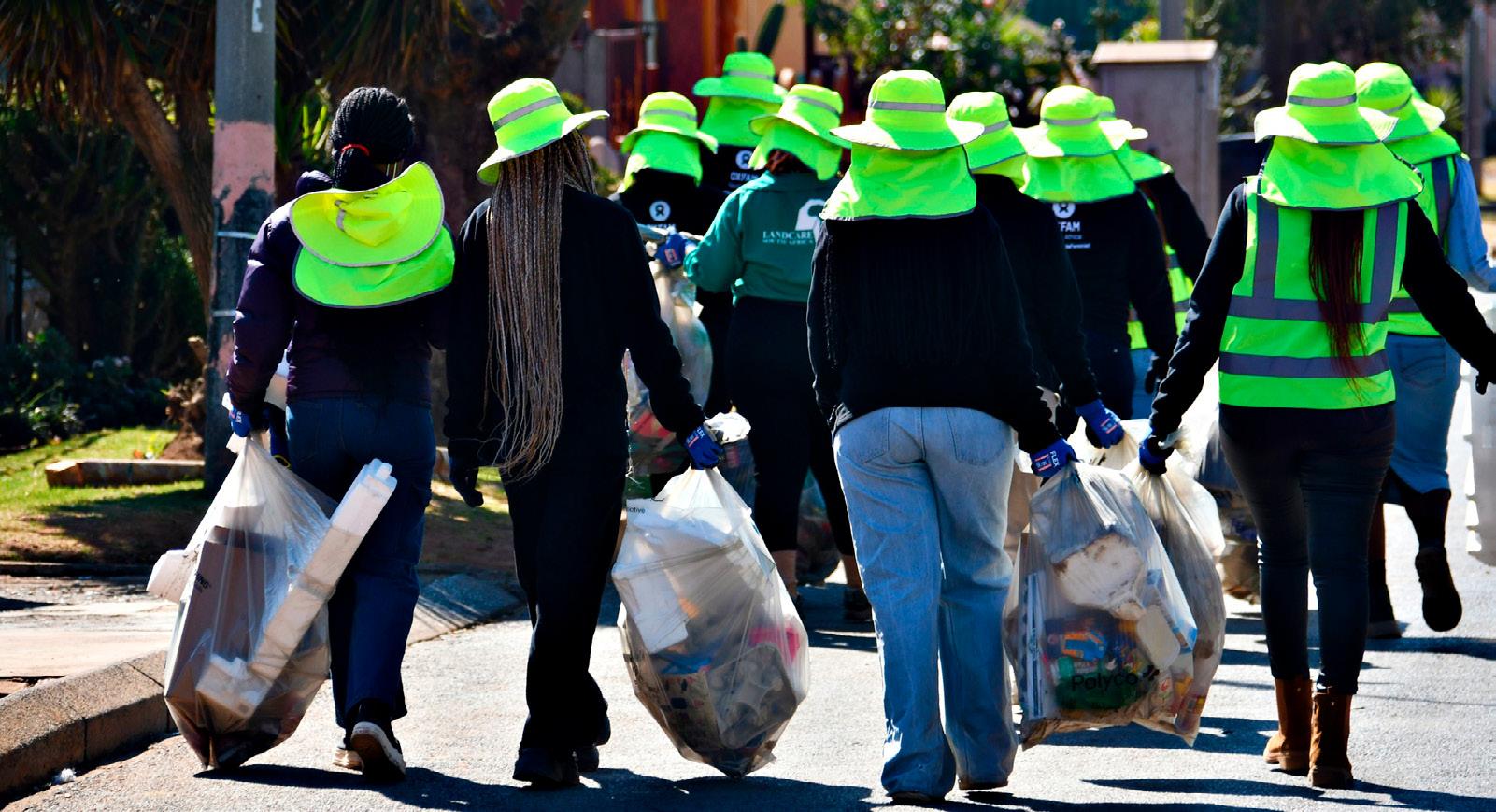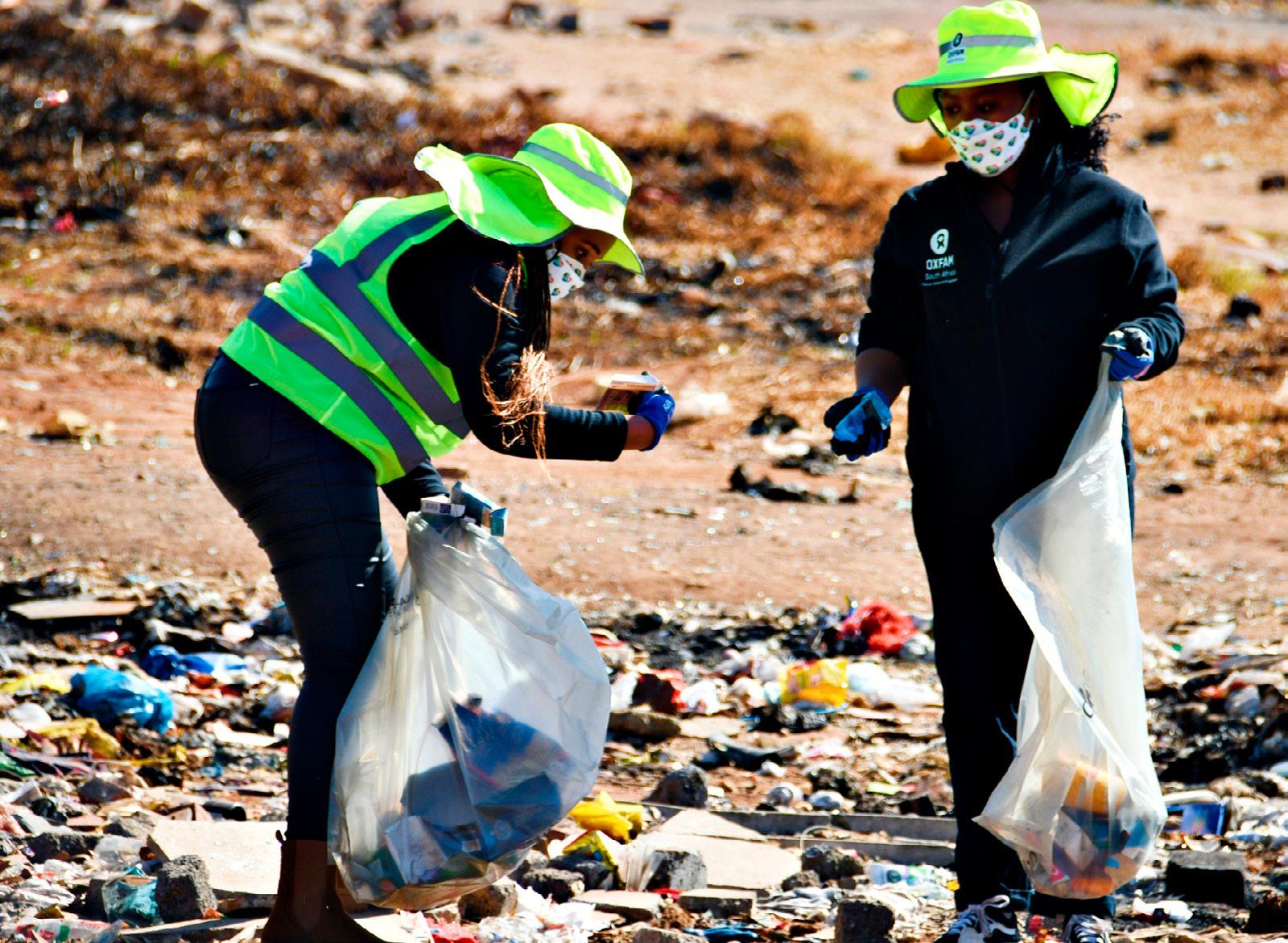
5 minute read
COMMUNITY-DRIVEN INNOVATION: DECOLONISING EMPOWERMENT THROUGH PIONEERING WASTE MANAGEMENT INITIATIVES FOR WOMEN AND YOUTH TO COMBAT GBV
South Africa’s waste management sector is vast and complex, involving everyone from municipal waste services to informal waste pickers. Yet, waste pickers at the bottom of this chain gain the least despite their essential role. For Oxfam South Africa, an inclusive economy demands innovative, community-led solutions that ensure no one is left behind.
Waste as a Site of Struggle and Opportunity
As an organisation committed to addressing the systemic inequalities that drive poverty, Oxfam South Africa focuses on Economic and Climate Justice through a decolonial feminist lens.
At the intersection of these themes lies the issue of waste - a space that presents opportunities to transform livelihoods and challenge the systems that marginalise vulnerable communities and perpetuate poverty and inequality, particularly for rural Black womxn.
Redefining Value through the Circular Economy
The waste management sector has provided fertile ground for innovation. In the City of Ekurhuleni, Gauteng, Oxfam South Africa has helped communities adopt circular economy practices in partnership with government, civil society, and private companies. The result is a collaborative, sustainable approach that uplifts waste pickers and redefines their value in the system.

Public perception often misrepresents waste pickers as young, male, unemployed and criminalised. In reality, many are womxn who collect recyclable materials to support their families. More recently - as the economic crisis has led to higher and higher unemployment levels - a growing number of unemployed youth from marginalised communities are entering the sector, not out of choice, but out of necessity, as formal economies fail to provide viable alternatives.
One such individual is Diopelo Tuna from Tembisa. With support from Oxfam South Africa and the City of Ekurhuleni, she transitioned from being a waste picker to running her own buy-back centre, Diakanyo Tsa Thari - which means ‘of like minds’ in seTswana. Here, recyclable materials are exchanged for cash, offering both income and dignity to those involved. Diopelo has since created employment for others in her community; an impact that extends far beyond her own journey.
Creating Safer Conditions for Womxn Waste Pickers
Despite these positive stories, womxn waste pickers face serious threats to their health and safety. Often starting their work before sunrise, and frequently working alone, their work renders them vulnerable to gender-based violence, among other social ills. This vulnerability is exacerbated by poor street lighting and lack of municipal infrastructure, creating dangerous environments that embolden predators. While some NGOs respond to immediate safety concerns by distributing tasers or whistles to womxn waste pickers, these practical measures do little to address the deeper structural inequalities that shape womxn waste pickers’ lives.
Something as basic as functioning streetlights can be a life-saving intervention. Lasting change requires municipal action that meets strategic gender needs, such as inclusive by-laws formulated in participation with womxn waste pickers, and securing working zones and womxn’s rights to operate and organise within the city’s waste economy. Supplies of industrial gloves and masks by the city council should be a requirement as waste pickers provide an essential service to the City. They also lead the way in environmentally friendly waste management.
A New Model for Local Economic Inclusion
Oxfam’s work in the sector culminated in an initiative that exemplifies what inclusive, feminist circular economics can look like: The Social Factory. Developed in partnership with the City of Ekurhuleni, Unilever, and the French Development Agency. This forprofit social enterprise model centres womxn waste pickers by giving them ownership of the recycling value chain.
The initiative includes three entities:
• Inclusive Recycling Pty Ltd
Oversees industrial processing
• The Recycling Community Trust
Supports informal waste pickers and places the majority shareholdership in the hands of community-based enterprises, thereby securing a dedicated investment in community-driven empowerment initiatives
• Fair Economies (Pty) Ltd
Through which Oxfam provides operational and strategic backing to facilitate fair trade and support local economic development.
Together, these entities form a working model that municipalities and civil society can adopt to bring both economic and social transformation. By empowering womxn waste pickers and supporting entrepreneurs like Diopelo, Oxfam South Africa is helping to combat youth unemployment while also addressing the climate crisis and intersectional socioeconomic issues that perpetuate poverty and inequality. The circular economy is not just a model for sustainability - it’s a model for justice.
Replicating Success: A Model for Inclusive Growth
Oxfam South Africa, a registered NGO, is looking to replicate the Social Factory model with other municipalities across the country. By collaborating with the organisation, you join a movement of change-makers dedicated to reducing poverty and inequality for the most vulnerable in our society. We are driven by our commitment to act in solidarity with marginalised communities to transform systems that perpetuate poverty and inequality so that everyone lives in dignity. #TheFutureIsEqual
A Model Worth Replicating
This is more than a recycling story. It’s about womxn reclaiming space in a system that excluded them.
It’s about creating jobs where there were none. It’s about restoring dignity in the margins of the economy.
When communities lead and cities listen - innovation happens.
The Social Factory shows what’s possible when partnerships work:
• Local ownership.
• Shared value.
• Real impact.
Municipalities have the power to scale this:
• To light the streets.
• To rewrite the by-laws.
• To back womxn and youth with infrastructure, not just good intentions.
“Because real change starts with who we choose to include.”










